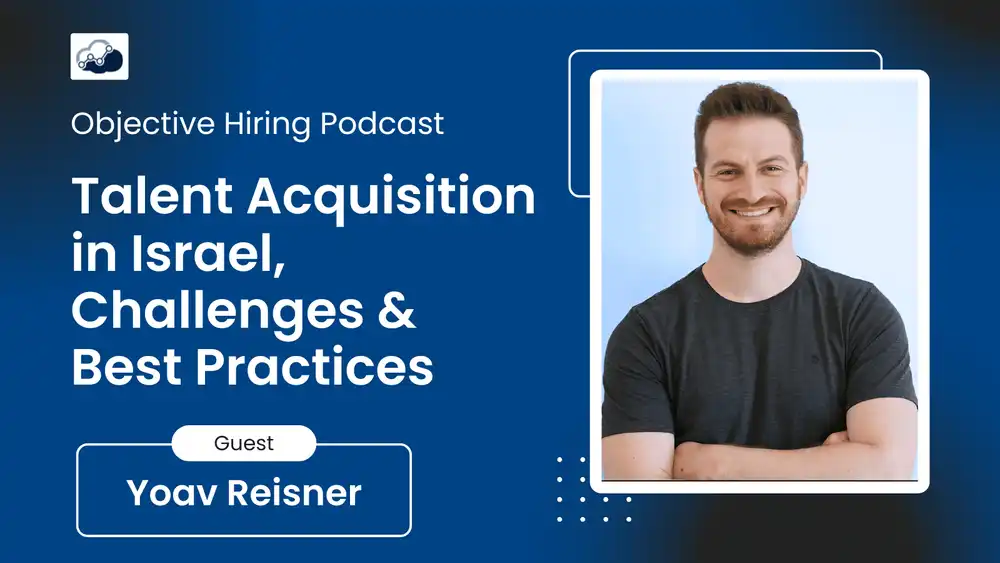Yoav Reisner on How Structured Interviews Help You Hire Better Data Talent

Hiring the right people is hard—especially when you’re flying solo without a talent team. In this episode of the Objective Hiring podcast, Tim Freestone, founder of Alooba, sat down with Yoav Reisner, Head of Data, to unpack a challenge many hiring managers face: how to objectively and effectively interview technical candidates.
“You need to understand why you think what you think about the candidate.” – Yoav Reisner
Yoav advocates for structured interviews—not just as a best practice, but as a necessity for making fair, reliable hiring decisions. This post dives into how Yoav runs structured interviews, why they're crucial in tech hiring, and how he’s adapting to candidates increasingly reliant on AI tools.
Why Structured Interviews Matter
“The ad hoc approach just allows you to sneak in so much more bias without noticing.” – Yoav Reisner
Structured interviews allow for fairer comparisons between candidates. By asking the same set of questions and applying consistent evaluation criteria, Yoav reduces the influence of unconscious bias—whether it’s caused by a bad night’s sleep or a candidate’s charm.
He admits that not everything can (or should) be fully scripted. Some flexibility is still needed:
“You need to keep it semi-structured… you should not be robotic.” – Yoav Reisner
A structured interview, in Yoav’s terms, is one where you have:
- A consistent set of questions
- A defined scoring system
- Pre-set parameters for what good answers look like
This structure is especially helpful when evaluating candidates from diverse or unconventional backgrounds.
Hiring People From Military Backgrounds
One of the unique challenges Yoav faces in Israel is evaluating candidates straight out of the army. Many of these applicants come from highly secretive units and can’t share specifics about their work.
“It’s already hard enough to understand boot camp graduates… military candidates are on a different level of challenge.” – Yoav Reisner
To address this, Yoav leans heavily on structured knowledge assessments rather than CV-based experience. Since the army doesn’t yet have a standard way of preparing tech veterans for the private sector, hiring managers are left to interpret vague credentials like “Product Analyst in Intelligence.”
This is where tools like Alooba’s skills assessments can help. They provide an objective way to measure ability—particularly useful when candidates can’t explain their previous roles in detail.
Objective Scoring: Avoiding the Halo Effect
A key part of Yoav’s process is using binary scoring:
“Boolean scoring is very good… did this guy in the SQL test write organised code or not—yes or no.” – Yoav Reisner
Rather than rating candidates 1–10 on vague criteria, Yoav simplifies it. He defines five to six clear attributes per question and scores them yes/no. This limits overthinking, reduces calibration issues, and makes it easier to compare candidates over time.
It’s a lean but effective way to stay objective.
Combatting Over-Reliance on AI
Yoav’s other concern? ChatGPT and tools like it. He noticed candidates increasingly outsource their thinking to AI—and not always in a helpful way.
“I’ve seen people that throw every problem at ChatGPT… and if they don’t get the answer, they get lost.” – Yoav Reisner
To counter this, he bakes traps into take-home tasks. For instance, he’ll include a subtle data error that LLMs typically miss—but that a competent analyst should catch.
“I ask ChatGPT to solve it first. Then I tweak the task to break it—see if the candidate blindly follows.” – Yoav Reisner
It’s a smart way to test real analytical thinking and flag one-trick ponies.
The Role of Bias in Hiring
Yoav is realistic about bias. He doesn’t believe it can be eliminated—but it should be managed.
“It’s okay to feel like someone’s not a fit… but you should also be able to say they’re technically strong.” – Yoav Reisner
This is why he pairs structured interviews with multi-manager reviews. Having multiple interviewers helps counterbalance personal preferences and brings broader perspective to each hire.
When There’s No Talent Team
Yoav has built his team without a dedicated HR or TA function. Instead, hiring is split among himself, the CTO, and CEO.
“We take turns doing the screening. Then someone else handles the technical interview.” – Yoav Reisner
He recommends involving at least one other manager—even if they’re from a different function—to give a second opinion and reduce hiring blind spots.
Planning Ahead Is Key
Many startups hire reactively. A team member leaves, and suddenly it’s panic mode. Yoav warns against rushing into a chaotic process.
“Hiring is hard. You need to plan, think through your interview structure, and clear out your calendar.” – Yoav Reisner
He limits hiring rounds to 2–3 stages to avoid burnout—for himself and for candidates. And he’s not afraid to cut interviews short when it’s clearly a no-go:
“You need to learn to end interviews gracefully… don’t waste anyone’s time.” – Yoav Reisner
Final Thoughts
Yoav’s approach is rigorous but simple. Structured interviews, objective scoring, soft filters for AI dependency—these all combine into a thoughtful hiring system that works without a formal talent function.
If you’re hiring data professionals—especially in environments with unusual candidate backgrounds—this episode is worth a listen. Yoav proves that structure doesn’t stifle creativity. It brings clarity, fairness, and speed.